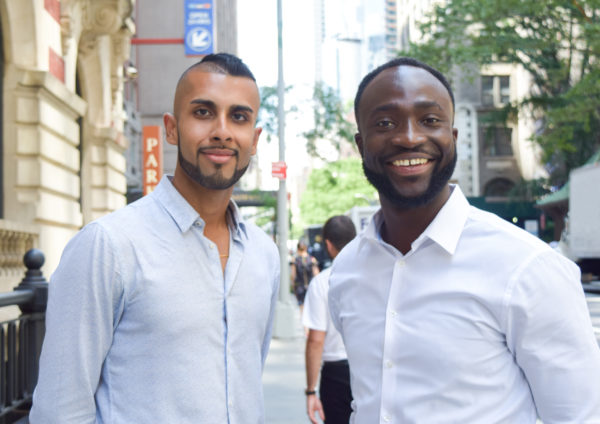In the eyes of entrepreneur Abbey Wemimo, there’s nothing he feels he can’t overcome.
That’s because he knows what it’s like to have very little, compete with the best and still come out on top. His winning secret, is simply knowing his stuff.
“They can rip everything away from you,” the 27-year-old executive said to Atlanta Black Star, “but they can’t rip your mind.”

He and co-founder Samir Goel started a set of savings and credit building apps dubbed Esusu Savings and Esusu Rent that on August 28 closed a $1.6 million seed round.
“With the support of our strategic investors and partners, Esusu is poised for unprecedented growth and ready to scale to serve the millions of Americans struggling to save and create a financial identity,” Wemimo said in an earlier statement.
The way Esusu works is by repackaging group savings and rent payments as forms of borrowing that could help improve users’ credit scores.
The name itself actually is a Yoruba word used to describe informal savings and credit associations for mutual benefit in traditional African societies.
“We create an agreement to save, and that’s seen in the eyes of the law as a debt obligation,” Wemimo explained.
Through the app, he and his co-founder work with landlords and renters to record rent payments and savings as debt obligations.
“Our system combined over 4,000 regulations to make sure data is accurately reported,” Wemimo said.
He came up with the idea for his app when his family, anchored by a single mom of three, struggled to afford his education.
Wemimo, always having been an A student, got into some of the top schools in Lagos, Nigeria, where he’s from. But unlike the children of prominent ministers and doctors he went to school with, Wemimo said his family “had nothing.”
“You just come from the slums,” he said, “and you barely have a toilet in your house.”
His relatives had to pool their resources to afford his education, and his mother contributed much of the money.
“My mother is one of the strongest persons I know,” Wemimo said. “She used 50 percent of her salary to afford my school.”
She did it without complaining, and Wemimo applied the same fervent dedication to his schoolwork.
That dedication got him into the University of Minnesota Crookston, where Wemimo applied with his sights set on going to an American university.
But without the money to pay for the tuition, he said he got a payday loan with a 400 percent interest rate, and, he added, that kind of borrowing is not uncommon.
“So this is the struggle of what’s going on in America,” Wemimo said.
He ended up graduating cum laude from the Minnesota-Crookston in 2013 and obtaining a full ride to New York University’s Robert F. Wagner Graduate School of Public Service, where he later graduated in 2015.
That led to a job as an operations risk analyst at Goldman Sachs and another doing mergers and acquisitions at PricewaterhouseCoopers.
All along the way, Wemimo said he and Goel were saving to start their own company.
The two had met at the Clinton Global Initiative, which convenes leaders from across sectors to solve global problems. They initially planned to partner in another business but changed their aim.
“We thought the issue was people needed to save more,” Wemimo said.
But after talking to consumers, they learned the real issue was actually accessing credit.
“There are 45 million people in the United States without a credit score,” Wemimo said in his statement. “Our platform helps to score them, build their credit profiles and will ultimately unlock over $3.1 trillion in untapped capital.”
He and Goel explained that Esusu simply digitizes one of the oldest forms of savings among immigrants from countries ranging from India to South Africa and European countries, and that time-honored form is pooled savings between families and friends.
“Our technology is capturing financial information that has never been recorded to equalize the playing field and increase access to capital and credit for millions that have been underserved by the financial system,” Goel said.




